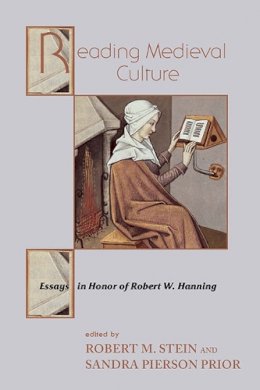Robert M. Stein is associate professor of literature at Purchase College and adjunct professor of English and comparative literature at Columbia University. Sandra Pierson Prior is a senior scholar at Columbia University, where she recently retired as associate professor of English and comparative literature and director of the composition program.
“Reading Medieval Culture is an apt title for a collection celebrating the work of Robert Hanning because in his career he has studied texts from a broad temporal range-Anglo-Saxon England to Renaissance Italy-of many genres-histories, romances, the drama-and some of our most significant authors-Chaucer, the Gawain-poet, Marie de France, Chrétien de Troyes, and Boccaccio.” —ENCOMIA: Bibliographical Bulletin of the International Courtly Literature Society “The editors of this volume properly stress the broad range of its contents, but there is also an underlying theme to the essays, just as there is to the work of Robert Hanning himself. It is the attention paid to the cultural circumstances of medieval writers and artists and twentieth-century critics, the desire to locate works in their contexts, that brings these critics together and makes this a fitting tribute.” —Journal of English and Germanic Philology “Reading Medieval Culture is an unusual festschrift in that it is not only a fitting 'tribute to Hanning's work and inspiration,' but also an unusual and important scholarly volume in its own right. The topics covered in this collection range over one thousand years, many countries, and a wide variety of works of literature, art, and history. Such an interdisciplinary and broad focus brings into relief Robert Hanning's lasting imprint on medieval studies, not least in the area of historicist literary criticism, as well as the breadth of his own work.” —The Rocky Mountain Review of Language and Literature "This volume of essays marks Robert Hanning's sixty-fifth birthday and retirement from Columbia University, with twenty articles on topics linked to strands of his work. . . . this is a volume to dip into; but the articles certainly attest the breadth and influence of the dedicatee's work." —The Heythrop Journal "The breadth and variety of this volume pay tribute to the influential, diverse, and copious work of Robert W. Hanning in English and comparative medieval literature. The essays are all newly commissioned, and range from the Anglo-Saxon period to the late fourteenth century, across a number of genres, languages, and cultures." —Medium Ævum "A scholarly compilation, with individual essays offering numerous quotes, and sources, for evidence of medieval thought and way of life, Reading Medieval Culture is a welcome contribution...." —Midwest Book Review "The 20 essays in this festschrift mirror the broad scholarly interests of Robert Hanning, whose career of studying texts and writing has influenced medieval scholarship in many ways. ...the essays are delightful,...." —Catholic Library World "These essays, which admirably reflect the enormous breadth of Robert Hanning's interests and teaching, will be of considerable value to scholars and students throughout the medieval and Renaissance academic community. The book's usefulness is guaranteed in part by the sheer range of subjects, from Bede to Castiglione, but even more by the extraordinary range of scholars represented, from the most widely respected medievalists of our day writing at the top of their form to some of the most promising young scholars in the field." —Linda Georgianna, University of California, Irvine "No rooting around in bottom drawers here! These distinguished contributors have shown respect for their friend and mentor by producing original, front-line work; essential pieces not to be found anywhere else." —Paul Strohm, Columbia University "Reading Medieval Culture gathers an all-star collection of scholars who have written essays that are not only grounded in sound scholarship, but also are important contributions to medieval studies. This is the kind of collection one does not often encounter: capacious enough to challenge all of its readers to new insights about the Middle Ages and to present new ways of examining materials that in many cases had begun to seem too familiar." —Jeffrey Cohen, George Washington University

